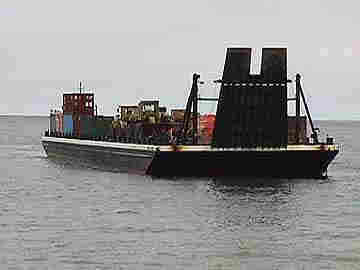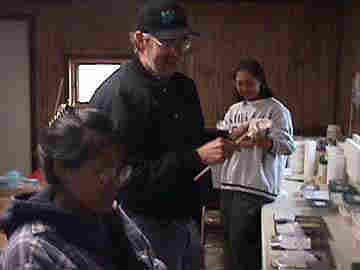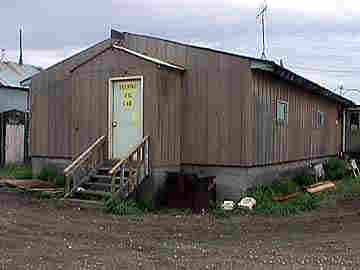20 July, 1998
7/20/98 A Day in the lab
*** Our barge comes in - safety meeting at 8 A.M. - learning and practicing
artifact conservation in the lab ***
When we got up this morning our barge was here with our
four-wheeler, stove, refrigerator and the rest of our camp. Aaron and I
will never see the camp built but the four-wheeler might save us some time.
All day long crews loaded and unloaded the barge as Deering residents
watched.
At 8 A.M. we had our safety meeting with all of the construction
crew. Rick Reanier (our leader) asked that we clarify safety issues with
regards to archeologists working in backhoe trenches. It is the
responsibility of the archeologists to monitor every inch of the
excavation, and we are concerned about the dangers [backhoes, cave-ins],
especially in the trenches.
During the day, I learned about artifact preservation in the lab
from our conservation specialist Randy Peterson. Randy carefully explained
cleaning procedures and preservation techniques using acetone, Acryloid
B-72 and Rhoplex AC-33. The idea behind preservation is to clean the
artifact without damaging it, then preserve the artifact without damage in
a manner that is reversible. I spent the rest of the day with the unique
privilege of conserving artifacts that are around 1000 years old.
AARON'S ADDENDUM:
Today in the field was very successful. With the transit in
operation we were able to accurately map each artifact as it was removed,
instead of just labeling it conservation 1,2 or 3. It really sped up the
operation.
We met the new plumber for Village Safe Water, Ben Deering. His
name is quite a coincidence, but it gets better. The town Deering was
named after a schooner that was shipwrecked nearby at the turn of the
century. What's more is that Ben's ancestors were shipbuilders, and they
built a ship named Deering, which was lost at sea about 150 years ago and
no one ever heard of it again!

Our barge.

Bonita Barr, Randy Peterson and Susie Barr working in the lab.

The UIC (Ukpeagvik Inupiat Corporation) field laboratory in Deering.
Contact the TEA in the field at
.
If you cannot connect through your browser, copy the
TEA's e-mail address in the "To:" line of
your favorite e-mail package.
|
